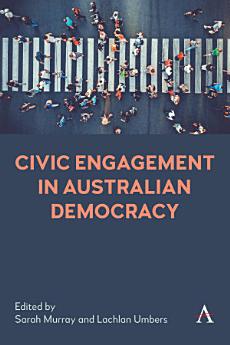Civic Engagement in Australian Democracy
Sarah Murray · Lachlan Umbers
mai 2025 · Anthem Studies in Australian Politics, Economics and Society 1. raamat · Anthem Press
E-raamat
234
lehekülge
family_home
Sobilik
info
reportHinnangud ja arvustused pole kinnitatud. Lisateave
Teave selle e-raamatu kohta
The Australian democratic system has long been regarded as one of the most stable and predictable in the world, with an entrenched two-party duopoly, compulsory voting ensuring high levels of electoral participation and relatively high levels of satisfaction with the democratic process. Yet the ways Australians engage with, and participate in, their democracy have shifted substantially in recent times. While a record proportion of Australians are now on the electoral roll, less than 1% belong to a political party, and the share of Australians that have always voted for the same party in Federal elections has declined from 72% in 1967 to 37% in 2022. Turnout in the 2022 Federal Election fell below 90% for the first time since the introduction of compulsory voting in 1924. Over 50% of voters cast their ballots early in 2022, up from around 10% in 2004. The advent of social media has afforded Australians a range of opportunities for political engagement but has also given rise to serious concerns surrounding the dissemination of misinformation. And Australians have also recently been afforded several historically rare opportunities for direct participation in the lawmaking process – particularly, the 2017 same-sex marriage plebiscite and the 2023 referendum on the Aboriginal and Torres Strait Islander Voice to Parliament.
These developments give rise to a wide range of deep, difficult questions for Australian democracy, many of which have been under-explored. What, for instance, does the failure of the referendum on the Aboriginal and Torres Strait Islander Voice to Parliament mean for Australian democracy? What sorts of opportunities ought to be afforded to Australians for direct participation in government? How might climate change impact Australian democracy in the coming decades? How might the rise in early voting impact the character of Australian democracy? What opportunities do Australians have for engagement in civic life, and what obstacles do they face in exercising them?
This edited collection brings together specialists in the democratic process to consider such questions, alongside many others. Moreover, the collection is uniquely interdisciplinary, insofar as the contributors are drawn from a diverse range of fields – law, philosophy, political science and sociology. The chapters each help bring us a broader understanding of civic participation in Australian democracy, in order that we might evaluate the status quo, and gauge where it might be headed, in the future.
These developments give rise to a wide range of deep, difficult questions for Australian democracy, many of which have been under-explored. What, for instance, does the failure of the referendum on the Aboriginal and Torres Strait Islander Voice to Parliament mean for Australian democracy? What sorts of opportunities ought to be afforded to Australians for direct participation in government? How might climate change impact Australian democracy in the coming decades? How might the rise in early voting impact the character of Australian democracy? What opportunities do Australians have for engagement in civic life, and what obstacles do they face in exercising them?
This edited collection brings together specialists in the democratic process to consider such questions, alongside many others. Moreover, the collection is uniquely interdisciplinary, insofar as the contributors are drawn from a diverse range of fields – law, philosophy, political science and sociology. The chapters each help bring us a broader understanding of civic participation in Australian democracy, in order that we might evaluate the status quo, and gauge where it might be headed, in the future.
Teave autori kohta
Sarah Murray is a Professor at the University of Western Australia Law School and is an expert in constitutional law and electoral law, court innovation and community justice centers.
Lachlan Umbers is Senior Lecturer and Chair of Philosophical Studies at the University of Western Australia. He works primarily in moral and political philosophy, with a particular focus upon issues in democratic theory and climate justice.
Hinnake seda e-raamatut
Andke meile teada, mida te arvate.
Lugemisteave
Nutitelefonid ja tahvelarvutid
Installige rakendus Google Play raamatud Androidile ja iPadile/iPhone'ile. See sünkroonitakse automaatselt teie kontoga ja see võimaldab teil asukohast olenemata lugeda nii võrgus kui ka võrguühenduseta.
Sülearvutid ja arvutid
Google Playst ostetud audioraamatuid saab kuulata arvuti veebibrauseris.
E-lugerid ja muud seadmed
E-tindi seadmetes (nt Kobo e-lugerid) lugemiseks peate faili alla laadima ja selle oma seadmesse üle kandma. Failide toetatud e-lugeritesse teisaldamiseks järgige üksikasjalikke abikeskuse juhiseid.





